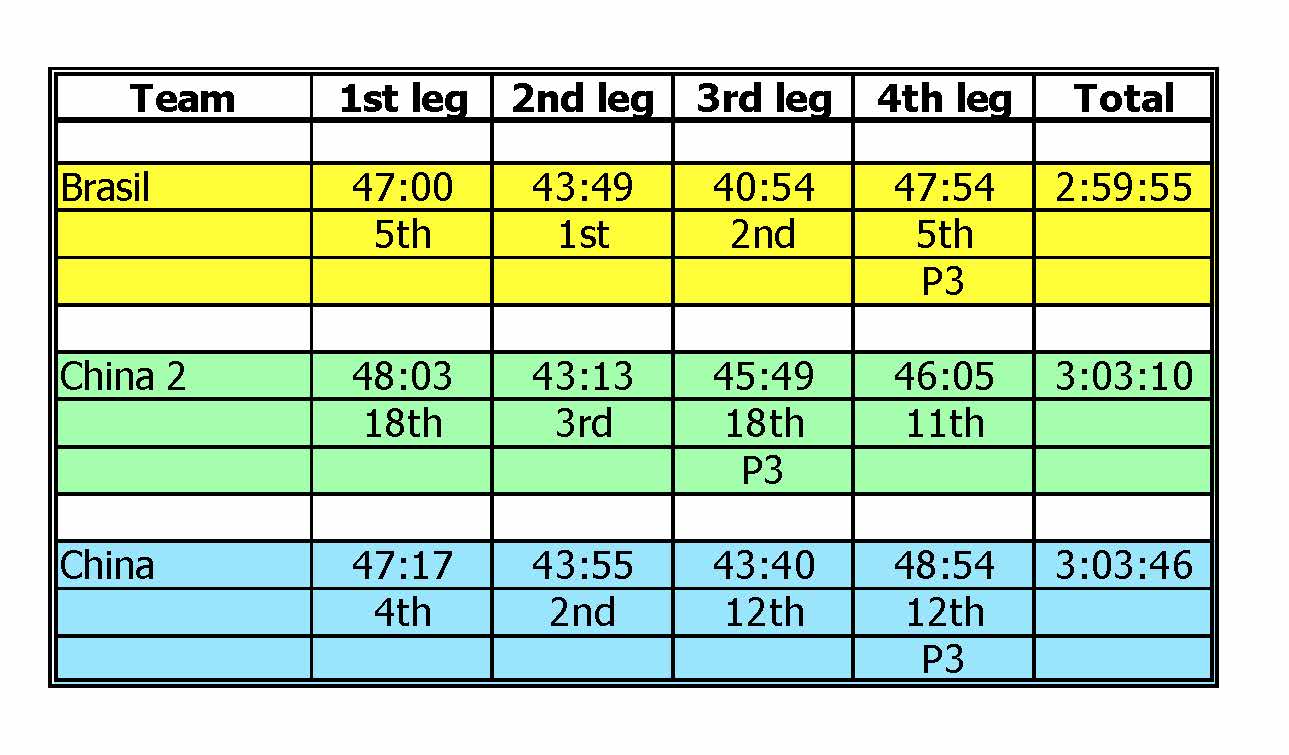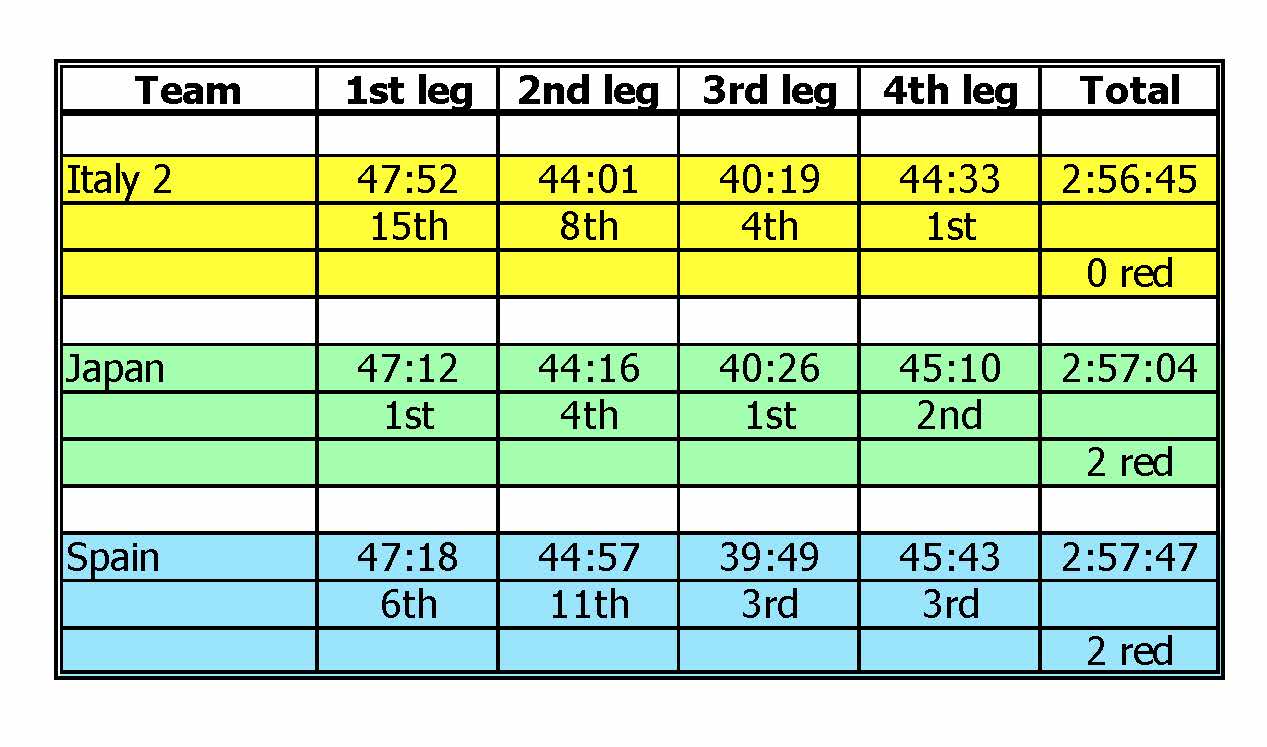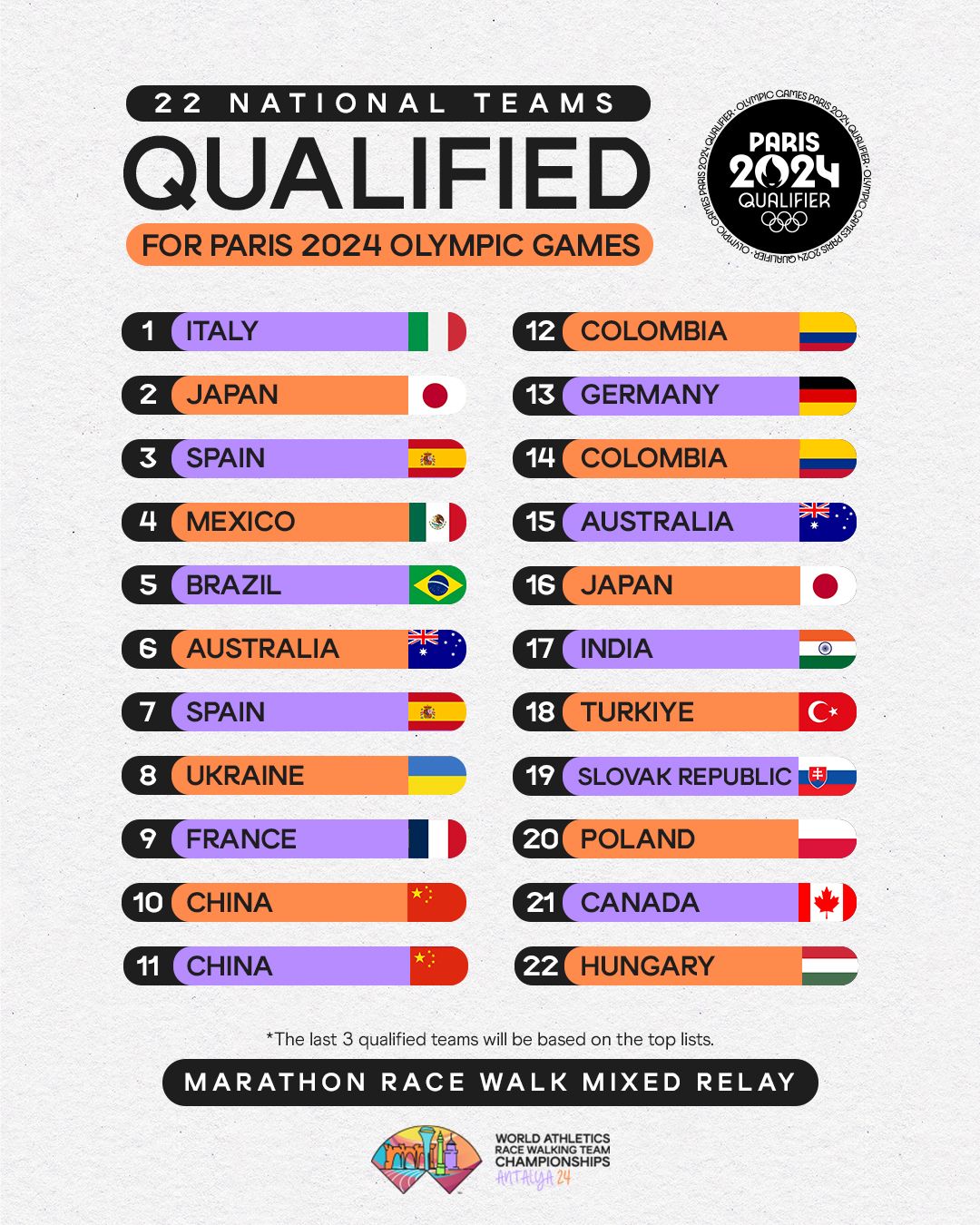Last March 11th we carried out the second of our analyzes on the first editions of the "Marathon Walking" relays after the test which took place in Valencia, Spain.
In our analysis we declared ourselves firmly convinced that the determining factor for winning gold at the Olympic Games should have been the "technical solidity" of the team. Today we have had proof of this.
We concluded by saying that. if the objective of World Athletics was that the winner expressed the most acceptable race walking technique, we admitted that the penalties identified contributed perfectly to achieving this objective.
Well, today we are even more convinced of this.
Analyses
We analyzed the progress of the competition of six teams: those who obtained the medals (Italy 2, Japan, and Spain) and those who we saw as among the favorites but who unfortunately had counter-performances (Brazil, China and China 2).
In all these analyses, the common denominator that led to the victory (or the counter-performance) was the "technical solidity" during the race.
Let's first analyze the counter-performances with the following table

Our readers will easily notice that the first stop in the Penalty Zone is the one that practically excludes the team from the medal game.
From the previous table we note that:
- Brazil, which was in second position when the "five" was passed in the fourth leg, had gained the lead of the race after two laps. The athlete (she was a lady) had led for over six laps and at the time of the stop in the Penalty Zone she had an advantage over Japan of just 5 seconds. With the three-minute stop she immediately goes from a probable victory to an unexpected fifth place, surpassed not only by Japan but also by Italy 2, Spain, and Mexico.
- Cina 2, who was in third position at the passing of the "five" in the third stage, the athlete (he was a men) had been forced to slow down because burdened by 2 red cards, and at the time of the stop in the Penalty Zone he was in seventh position. The three-minute stop immediately drops him to eighteenth position. Subsequently, with a good recovery by the lady in the last leg, walking at an average of 4:30/km, she will finish eleventh, but ahead of her teammates from Cina 1.
- China 1 experienced an even more complex situation. Up until the 7km mark of the third leg the athlete (he was a men) was in third position with a gap of less than ten seconds from the lead of the race. The sudden crisis of the walker, among other things burdened by 2 red cards, causes him to fall to tenth position at the last change. The last fractionist (women) progressively recovers ground. She is in eighth position at the moment in which she is notified of the third red card which involves a 3-minute stop a few meters from the finish line. She will finish twelfth.
These are only three of the episodes (for us the most interesting and striking) which depended on a lack of "technical solidity" during the race.
We could mention many others, but we leave it to our readers to grasp the meaning of these examples themselves by carefully looking at the competition summaries.
The following table shows the reasons for the success of the Italian team

Numbers rarely (in fact almost never) lie.
And in this case the numbers clearly tell us the following:
1.- the time gap between the walkers from Japan and Spain in the first leg is evident if you compare it with that of the walker from Italy
2.- the female relay walkers showed up at the start with the following Personal Bests: ITA - Trapletti: 44:25 (2022); Japan - Okada: 42:46 (2024); Spain - Garcia-Caro: 43:50 (2022)
3.- in the second leg, however, the best time was that of the Italian, who gained 15 seconds on Japan and 56 seconds on Spain
4.- at the start of the third leg behind Brazil (leader) there is a large group which also includes China and China 2 while Italy 2 and Spain are in eighth and eleventh position with delays of 46 seconds and 1:08
5.- during the third fraction, as we have seen previously, China 2 is stopped and exits the game for the medals, but we also see a drop in the Japanese competitor (Ikeda) who covers his second leg in 40:26 against of the first 10km of the race which he had covered in 39:46. On the other hand, both Fortunato (Italy 2) who covered his second leg in 40:19 compared to the first 10km of the race which he had covered in 39:59, and above all Martin (Spain) who covered his second leg in 39:49 compared to the first 10km of the race which he had covered in 39:45.
6.- it is in this phase of the race that red cards begin to take on an important role. In fact, in the top ten teams Brazil, China, Japan, Spain, Australia and Spain 3 are burdened by two red cards. Mexico, Spain 2, Ukraine 3 and France only have one. Italy 2 has none.
7.- Spain thinks about maintaining its positions and not taking risks: Garcia-Caro covers her fourth leg in 45:43 compared to the second 10km of the race which she covered in 44:57
8.- Brazil is in the lead up to 40km, but is rushed off Japan’s feet who is 2 seconds away. Some mechanism jams up and the third red card arrives and with it Brazil rushes after a 3 minute stop in fifth position.
9.- Japan's lead race only 1km and at 41km it still has a 3 second advantage over the chasing Italia 2, which however overtakes it during the last kilometer and takes off towards victory. Trapletti's last 10km (and change) are covered in 44:33, Okada's in 45:10.
In our opinion, not only Italy won. The victory arises to team that presented the greatest "technical solidity" during the race. We would have been equally happy with the victory of any other team that had finished the 42.195km in the identical technical conditions.
Qualified for Paris 2024 Olympic Games

What does the future hold for us?
We were convinced that the most optimistic choice would lead to a potential result around 2:51:30, while the most pessimistic one could be a result around 2:55.30.
Today, frankly, we are no longer so optimistic. Do not bet one Euro (or if you prefer one Dollar) on a time lower than 2:52:00.
Instead, we would feel more courageous in hypothesizing a result at the Olympic Games between 2:54:30 and 2:55:30.
But to achieve this performance, all teams will have to dedicate the remaining part of the season to reflecting a little less on the clock and a little more on "technical solidity".
It means a good comprimise between speed and technique.
A great walker of the past used to say: "It's not important to win, but it's more important how you win."
The time of 2:54:30 can be achieved. If someone achieved it (or perhaps improved it) in the way that Antalya's 2:56:45 was achieved, we would certainly have witnessed a spectacular race and there would no longer be any fear of exclusion of race walking from Athletics program.